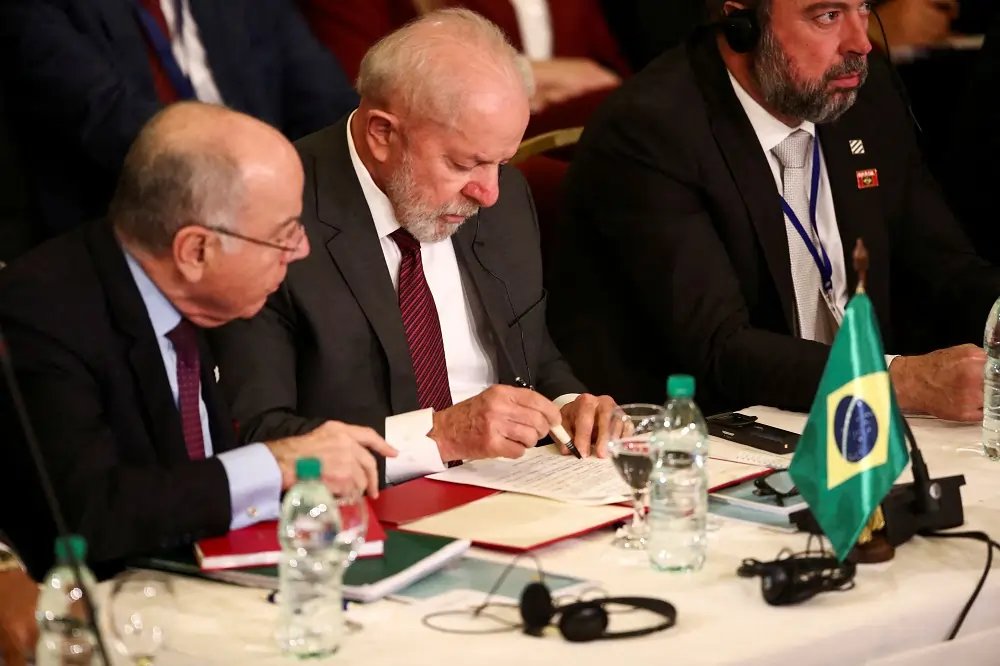EU deal and Trump tariff threats bolster Mercosur trade talks
Published by Jessica Weisman-Pitts
Posted on December 20, 2024
4 min readLast updated: January 27, 2026

Published by Jessica Weisman-Pitts
Posted on December 20, 2024
4 min readLast updated: January 27, 2026

By Lisandra Paraguassu and Anthony Boadle
BRASILIA (Reuters) -Brazil expects the South American trade bloc Mercosur to speed up more free trade negotiations after clinching a deal with the European Union, as the threat of U.S. tariffs when Donald Trump takes office as president forces countries to diversify their options for exports, diplomats say.
Topping the list of Mercosur’s most likely new trade pacts next year are deals with the European Free Trade Association of four non-EU nations and with the United Arab Emirates, the diplomats said on condition of anonymity.
Singapore also reached an agreement with Mercosur this year that is being translated so it can be sent to the country’s president and lawmakers for ratification, a diplomat said.
“This is undoubtedly a good time for the Mercosur bloc to move forward with other negotiations. Some countries have already approached us interested in expanding negotiations,” a Brazilian official said.
If the pacts materialize, they would mark a revival for the trade bloc. Mercosur includes South America’s two largest economies, Brazil and Argentina, but has long suffered from internal divisions and skepticism about its effectiveness. Uruguay and Paraguay are also founding members of Mercosur, which Bolivia joined this year.
Norway, one of the non-EU members that is part of the EFTA group, confirmed it is keen to sign an EFTA-Mercosur deal in the first half of 2025.
"A Free Trade Agreement between Mercosur and the EFTA states is a high priority for Norway. I hope to see the negotiations concluded as soon as possible," Norwegian Minister of Trade and Industry, Cecilie Myrseth, said in a message to Reuters.
“With the trade talks between EU and Mercosur now concluded, it should be possible for EFTA and Mercosur to shortly come to an agreement on the very few outstanding issues,” she added.
For its part, UAE hopes to deepen commerce with the Mercosur bloc “within the next year” with an agreement that would open opportunities for businesses across the Middle East and Latin America, its Trade Minister Thani Al Zeyoudi said in a statement to Reuters.
THREAT OF TRUMP TARIFFS
Threats of fresh tariffs from Trump, who takes office in a month’s time, have also forced the biggest U.S. trade partners to consider their alternatives, even as their priority is defending the U.S.-Mexico-Canada Agreement on trade.
Although Mexico expects a successful review of the USMCA in 2026, it has also begun to explore other options, which include deepening its trade agreement with Mercosur, according to two Mexican government sources.
“In an increasingly divided world where protectionism is gaining strength, President Claudia Sheinbaum wants a more integrated Mexico that can face what is coming,” said one of the sources. “Therefore, the task is to diversify investment, trade and relations as a whole,” they added.
The Mexican presidency and Economy Ministry did not immediately respond to requests for comment.
A Mercosur official said there are also discussions underway for a trade deal with Canada. However, a Canadian diplomat said the focus on USMCA talks may mean other talks have to wait.
"We will be so busy dealing with Trump that our negotiators won't have time to negotiate with Mercosur," a Canadian diplomat said.
A spokesperson for Canada’s Global Affairs Ministry said the last round of talks with Mercosur was held in 2019 and “no further rounds are currently scheduled.”
Talks are already underway between Mercosur and South Korea, Vietnam, Indonesia and Lebanon, Brazil’s Foreign Ministry said. Those countries’ embassies in Brasilia did not reply to a request for comment.
“There are other trade partners we want to talk to, especially in Asia,” said another official in Brasilia.
In some cases, talks have hit against resistance from farm lobbies in other countries wary of competing with agricultural powerhouses Brazil and Argentina, a Brazilian diplomat acknowledged.
(Reporting by Lisandra Paraguassu and Anthony Boadle in Brasilia; Additional reporting by Diego Ore in Mexico City and Nicolas Misculin in Buenos AiresEditing by Brad Haynes, Alistair Bell and Frances Kerry)
Mercosur is a South American trade bloc comprising Argentina, Brazil, Paraguay, and Uruguay, aimed at promoting free trade and economic integration among its member countries.
Foreign currency refers to the money used in a country other than one's own, which is often needed for international trade and investments.
Explore more articles in the Top Stories category











